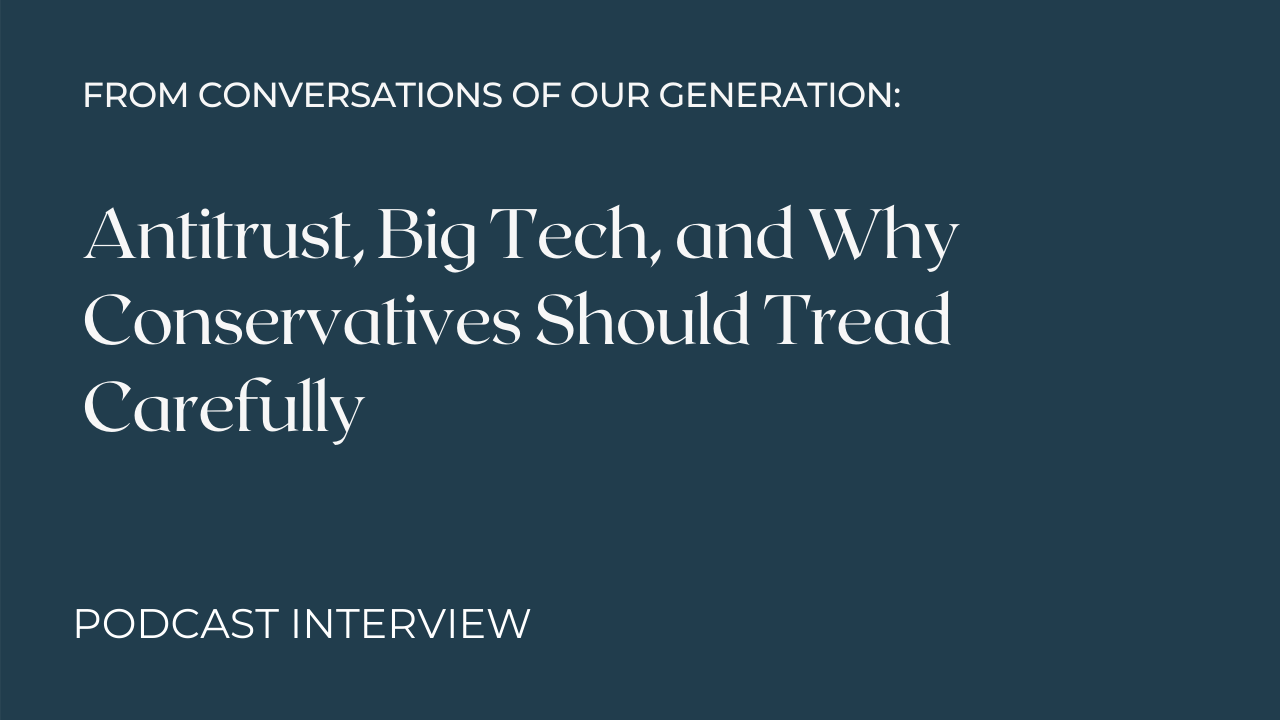![Administrative Agencies and Antitrust in 2024: Major Developments and a Look Ahead [Part 1]](https://images.squarespace-cdn.com/content/v1/5f303057191d634553dc0725/1715872880475-MMJF5M86WTT0KQJ595V6/download.jpg)
Administrative Agencies and Antitrust in 2024: Major Developments and a Look Ahead [Part 1]
This is the first panel of a conference hosted by the Committee for Justice examining FTC and DOJ agency actions, congressional oversight, litigation, the effects of Lina Khan’s approach on the economy and the law, and what we can expect to see in 2024.
![Administrative Agencies and Antitrust in 2024: Major Developments and a Look Ahead [Part 2]](https://images.squarespace-cdn.com/content/v1/5f303057191d634553dc0725/1715872424787-DS04FJ63MNDYGDP5681B/images+%281%29.jpg)
Administrative Agencies and Antitrust in 2024: Major Developments and a Look Ahead [Part 2]
This is the second panel of a conference hosted by the Committee for Justice examining FTC and DOJ agency actions, congressional oversight, litigation, the effects of Lina Khan’s approach on the economy and the law, and what we can expect to see in 2024.
![Administrative Agencies and Antitrust in 2024: Major Developments and a Look Ahead [Part 3]](https://images.squarespace-cdn.com/content/v1/5f303057191d634553dc0725/1715872192499-VGD2BHK49K42ORSAPZY2/images.jpg)
Administrative Agencies and Antitrust in 2024: Major Developments and a Look Ahead [Part 3]
This is the third panel of a conference hosted by the Committee for Justice examining FTC and DOJ agency actions, congressional oversight, litigation, the effects of Lina Khan’s approach on the economy and the law, and what we can expect to see in 2024.
![The FTC in Courts and Congress: Here Comes Trouble? [Part 1]](https://images.squarespace-cdn.com/content/v1/5f303057191d634553dc0725/1715882638645-R77F6RA3MW58CILYT6C0/7.13+Antitrust+Panel+YouTube+Thumbnail+%281920+%C3%97+1080+px%29.png)
The FTC in Courts and Congress: Here Comes Trouble? [Part 1]
This is the first panel of a two-part discussion on the Federal Trade Commission (FTC) in both the courts and in Congress, examining potential constitutional challenges, congressional oversight, and legislative priorities.
![The FTC in Courts and Congress: Here Comes Trouble? [Part 2]](https://images.squarespace-cdn.com/content/v1/5f303057191d634553dc0725/1715882955795-HOJ4O548LVD3W0YG2BO0/Panel+2+7.13+Antitrust+Panel+YouTube+Thumbnail+%281920+%C3%97+1080+px%29.png)
The FTC in Courts and Congress: Here Comes Trouble? [Part 2]
This is the second panel of a two-part discussion on the Federal Trade Commission (FTC) in both the courts and in Congress, examining potential constitutional challenges, congressional oversight, and legislative priorities.

The National Security Implications of Antitrust: An Introduction

Big Tech, Antitrust, and Liberty
Recent actions by several tech companies of "deplatforming" some people have lead to a call for government to "do something." Many people are calling for antitrust legislation to break up Facebook, Twitter, Amazon and other tech companies that have a seemingly insurmountable advantage and are engaging in anti-competitive tactics. Is this a legitimate complaint?

Biden's Executive Order on Competition: A Discussion
On July 9, President Biden signed the Executive Order on Promoting Competition in the American Economy, which is perhaps the most sweeping executive order in several decades, and will drastically expand the power of the federal government. The E.O. contains 72 specific actions that will impact not only tech companies, but also financial institutions, internet service providers, pharmaceutical companies, railways, airlines, biopharmaceutical innovators, drug prices, patent owners, and much more.
Our panel of antitrust experts discuss the underlying justifications for the order, the possible effects, and the implications for consumers, businesses, and regulatory agencies.

The Common Purposes of Intellectual Property and Antitrust
Although the compatibility of intellectual property (IP) and antitrust has been widely recognized by Congress and the Supreme Court, recent discussions of monopolies in digital markets often presents IP rights and antitrust laws as conceptually incompatible concepts. The nexus between property rights and competition is complex, but ultimately IP and antitrust share common goals of increasing market output, value, and competition. Guided by the consumer welfare standard, modern antitrust law rejects the notion that mere possession of a patent or copyright constitutes possession of anticompetitive market power and makes clear that applying for or enforcing these rights does not establish exclusionary conduct. And while patents and other forms of IP are frequently described as incentives to innovate, their disruptive, anti-monopoly effects are often overlooked. Our panel of experts discuss the nexus between patents, copyright, and competition as well as recent developments at the interface of IP and antitrust law.

Antitrust and Big Tech: Does New Technology Call for New Rules?
Recently, Senator Amy Klobuchar (D-MN) introduced a bill that would overhaul the past forty-five years of antitrust law by rewriting legal standards, changing guidelines for mergers, and expanding the government’s civil penalty authority. Additionally, the House Judiciary Committee conducted its own investigation and released a report on competition in the digital market.

Is Big Tech Too Big? A Conversation on Tech, Antitrust, and Whether Its Time to Break Up the Giants
The Cornell Federalist Society and the Adam Smith Society host Ashley Baker, Director of Public Policy at the Committee for Justice, and Joseph Malchow, founder of Publir and venture investor. Ashley and Joe discuss legislative proposals and weigh in on current debates over the proper scope and purpose of federal antitrust law.

Explainer: Senator Klobuchar's Antitrust Bill
How would the bill adjust the definition of "exclusionary conduct"? What would it mean for the government's ability to seek civil fines for antitrust violations? And how does the bill fit into the larger conversation about antitrust law in Washington?

